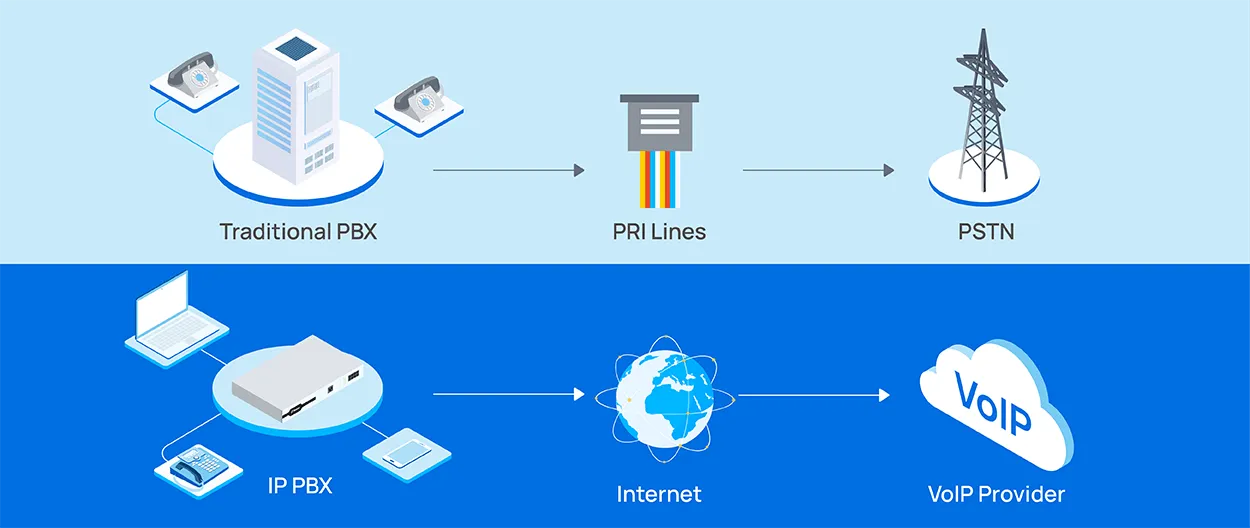
If you run a small business and are keen to upgrade your comms network and save money too, then you may be wondering whether a VoIP or a PSTN is the best option.
Keep reading to find out the relative benefits of each service to help you make the right choice. But first...
What are VoIP and PSTN?
Let's get to grips with the acronyms first off. VoIP stands for Voice-over-Internet Protocol, while PSTN is short for Public Switched Telephone Network.
A VoIP system allows you to make telephone calls via an internet connection by the transfer of real-time voice signals that travel from one IP address to another. Calls can be made either from one VoIP phone (either an adapted regular handset or a special VoIP phone) to another or from computer to computer.
PSTN also works through the transfer of digitized voice signals, but, unlike VoIP, these signals aren't carried via an internet connection but instead travel through the traditional phone network as well as the cellular network and fiber-optic cables.
Choosing Between VoIP and PSTN
As a small business, making cost-effective choices are vital --- consider the below factors to help you decide on the best comms system for your enterprise:
Consider Connectivity
VoIP calls connect via the internet, whereas PSTN connects using landlines. Therefore, as long as you have access to the internet, you can make a VoIP call. This is often an attractive perk for small businesses and start-ups, as it allows for flexibility and doesn't require expenditure to be made on the installation of landlines. It also means that you can make calls on the go, from wherever you are, as long as you can connect to the internet.
Scalability
While PSTN systems are relatively fixed --- for example, adding new telephone lines would require installation work --- VoIP is an easily scalable option so that it can grow with your business, adapting to your changing needs over time. Extra phone numbers, extensions, and devices can be added to a single service hassle-free and often in a matter of minutes. The great thing about this is that you'll only pay for what you need and are using, rather than spending out on equipment and phone lines that you may not initially require, and you can adjust your service as you go.
For more information on how easy it is to scale up VoIP provision, have a look at this article on VoIP providers; you'll find details here, too, on the other advantages of choosing VoIP comms for your business and links to some of the top-rated services.
Service Cost
Considering the cost is important, especially for small or new businesses that may have limited resources and want their budget to stretch as far as possible. The fact that a VoIP system is, in the vast majority of cases, a significantly cheaper option than PSTN is making it an increasingly attractive proposition to businesses of all sizes.
Most VoIP providers offer a range of packages, and choosing the best one for your business could potentially save you hundreds of dollars a month on your comms bill. As well as this saving, you can also save yourself the expenditure of expensive equipment and maintenance costs by going down the VoIP route.
Choosing the Most Suitable VoIP Package
So, now we've ascertained that, in most cases, a VoIP will benefit your business. How to choose the right provider and package?
Firstly, it's vital to have a clear idea of the needs of your business --- every enterprise is different, so think carefully about what you want from your comms network and the way that your business operates. You can then narrow down the providers and plans based on how well they can fulfill your needs.
Next, compare the price of your shortlisted options, thinking about the features that would be of use to your business; for example, it may be wasted money to pay a premium price for tools or features that you won't regularly use.
Now, it's time to ensure that the VoIP you're considering can properly integrate with the apps that your business uses. Consider, too, whether in the near future you'll be likely to need additional apps and extensions, and make sure that the VoIP you're looking at can fully support these, too.
Finally, before signing up for a plan, ascertain the level and type of customer support services available; service interruption could have a significantly detrimental effect on your business, so it's worth finding out if you can access help on a 24/7 basis should it be required. Find out, too, the channels via which you can access this support and the reliability of the service --- having a look at reviews from past, and current customers can help you get an idea of these things.
Choosing the right VoIP service for your business can save you money and make for smoother and more flexible working. Take some time to research the best option for you, to fully reap the rewards of this type of comms network.
